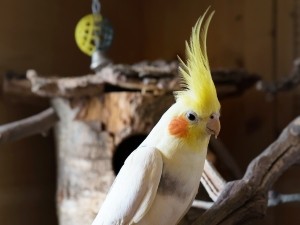
While cockatiels don’t suffer the stress of having to meet deadlines and don’t suffer from any of the other types of stressors that humans do, they still do suffer some stress.
If you’d like to know what signs to look out for that communicate that your bird is stressed then read on.
Table of Contents
Cockatiel signs of stress:
Knowing what to look for when it comes to your cockatiel being stressed will help you figure out if your bird is going through something and needs an intervention.
Here are signs that your bird may exhibit if it is stressed:
Plucking:
One of the signs of a bird being stressed is plucking its own feathers.
Healthy and relaxed birds will preen themselves gently going through their feathers, but, this preening will be taken to the extreme if the birds are stressed leading to self-plucking.
This excessive plucking may eventually lead to bald patches developing on your bird.
Aggression:
The bird will not only become aggressive towards itself by plucking at its own feathers, the bird will also become aggressive to you, to other birds, and will be aggressive in general in its cage.
This is a far cry from the birds usual relaxed and friendly nature. Your bird may start to get nippy and fight or even bite you or the other birds in the cage when stressed
Weight loss:
When a bird is stressed the stress may cause the bird to start eating irregularly, eat less or not eat at all.
This will eventually cause the bird to become underweight and this weight loss can quickly be seen by you as the pet’s owner.
Squawking and screaming:
These birds are known to sing at times, talk at times, and even whistle at times. They do this when they are in a good mood.
However, if your bird starts screaming, shrieking, and squawking at random times at what seems to be nothing then the bird may be chronically stressed.
These loud vocalizations may also be accompanied by the bird rapidly flapping its wings.
Destructive behavior:
The items in your birds cage, like the bird’s bedding, toys, and food bowls are meant to make the bird’s cage more comfortable.
However, if your cockatiel starts to destroy the things in its cage and becomes destructive then the bird may very well be stressed and even chronically stressed if the bird doesn’t stop this behavior.
Fear:
A cockatiel that is stressed will become more fearful of you and others even if it was previously used to you and others.
The bird may become scared of you or it may become stressed because of something you’re wearing or something new on you like new facial hair, a new hat, or, a brightly colored shirt.
Stress bars:
If your bird was stressed during the feather molting and feather regrowth stage then the bird may develop stress bars on its feathers. Stress bars are lines that run horizontally across the bird’s feathers.
This area of the feathers may be discolored and will be thinner than it should be and the feathers will have an overall distressed look.
The long-term effects of stress:
Stress was never meant to be something that anyone, birds included, experienced long-term.
If the stress becomes chronic, then the bird may start to develop serious health issues which can eventually kill the bird.
When your cockatiel becomes stressed the bird’s body will circulate adrenaline.
While adrenaline is useful in that it helps the bird be more alert and fast to fly away if there is say a predator around, if the bird’s body maintains high levels of adrenaline in its body for long periods of time, the bird can develop high blood pressure, fatigue and obesity which can lead to the death of your bird.
This is why removing the stressors in your bird’s life is important.
What to do:
These animals can become stressed because of a variety of reasons, they can become stressed about what humans see as the smallest of reasons.
Reasons why these birds may become stressed include sudden noises, new people or pets in the area, a change in environment, a new routine, a change in paint color, or a change in lighting to name a few.
These birds like sameness and consistency, you would either need to remove the stressor if the stressor is a person or animal, or get the bird back into its old environment.
You can then gradually introduce these new elements into your bird’s life.
If doing this is not effective then you may want to consider taking your bird to an avian vet to check for any health problems.
Keep stress levels low on the way to the vet by placing the bird in a pet carrier or box.
Cover the box or pet carrier to keep the bird from becoming stressed seeing new environments around it, and make sure that you drive calmly to keep from frightening the bird.
If you enjoyed this article then you may also be interested in other bird related articles. Here are some articles that you may be interested in: Cockatiel Temperament, Baby Bird Heat Lamp, Hand Feeding Cockatiel Problems, Why Does My Budgie Put His Foot On The Other Budgie?, Why Are My Conures Feathers Turning White?, Natural Anti-Inflammatory For Birds, Birds’ Feathers Curling Up

